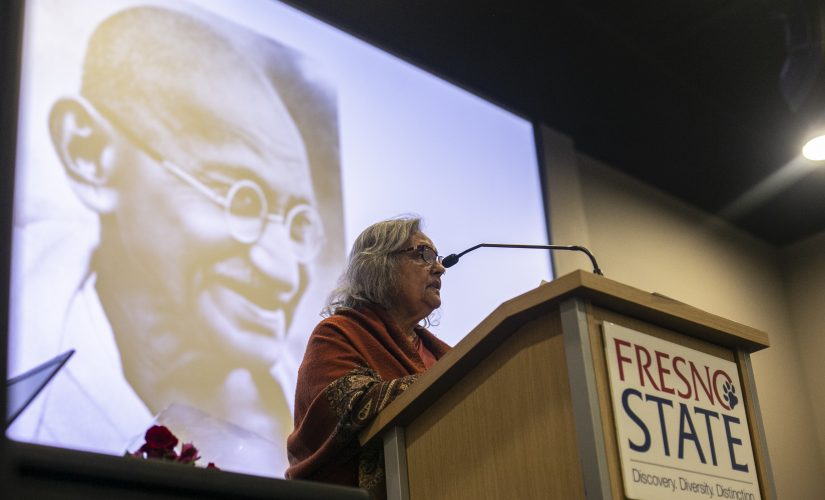As part of the celebration for Mahatma Gandhi’s 150th birthday, Fresno State welcomed a number of speakers whose work has honored the legacy of the civil rights activist.
Among those who have cited Gandhi’s work as influential in their own pursuits were the Rev. James Lawson Jr. and activist Dolores Huerta, both of whom spoke on Oct. 10 and 11, respectively.
The commemoration concluded on Oct. 14 with a visit from Ela Gandhi, Gandhi’s granddaughter, who spoke in the North Gym.
Huerta was a co-founder of the United Farm Workers (UFW) labor union, along with Cesar Chavez. Huerta spoke about how her and Chavez’s founding tenets of the union were based on Gandhi’s message of nonviolence.
“Before we started the union, Cesar and I sat down and we kind of talked about how we were going to start,” Huerta told the audience in the Peters Business Building Room 191. “And it was based on Gandhi. It had to be based on Gandhi’s principles.”
Huerta’s discussion focused on issues in the Central Valley, such as poverty, incarceration and pollution, and how through compassion, understanding and unity these issues can be overcome, stating: “We are one human race.”
Huerta suggested that messages promoted by Gandhi, the Rev. Dr. Martin Luther King Jr. and Lawson Jr. should be implemented in the school system in order to foster a culture of togetherness and nonviolence at an early age in future generations.
Following Huerta’s talk, she was joined by Lawson Jr., who also spoke the day before at the Satellite Student Union, as the two discussed the implementation and practicality of Gandhi’s teachings and philosophy.
“Every human being has power, and that every human being learning to use that power in a fashion that ennobles their own living, lifts their own understanding of life,” Lawson Jr. said. “It is a part of the beginning of nonviolence.”
Lawson Jr. is a minister and activist whose work as a tactician and theoretician of nonviolence contributed to the American Civil Liberties Movement.
Ela Gandhi spoke about how her grandfather’s work, not only was significant in its time, but how the principles and precepts he taught still hold relevance in the 21st century. She read quotes from her grandfather’s writing that reflected these teachings and demonstrated the aim in his pursuits.
“His views were prophetic,” Ela Gandhi said. “In 1909, he wrote and I quote, ‘Men will not need the use of their hands and feet. They will press a button and they will have their clothing by their side. They will press another and they will have their newspaper.’”
Ela Gandhi’s discussion examined how her grandfather respected the views and passion of many who sought to right injustice through extreme methods but focused on how his teachings aimed to inspire them to pursue a more peaceful approach through understanding and nonviolence.
Ela Gandhi also spoke about how many young people in the world are seeking to make a difference in the world. She said that her grandfather would embrace the passion of today’s youth but would implore them to pursue change through peace.
“‘Action is good, but it has to be nonviolent action,’” Ela Gandhi said.




